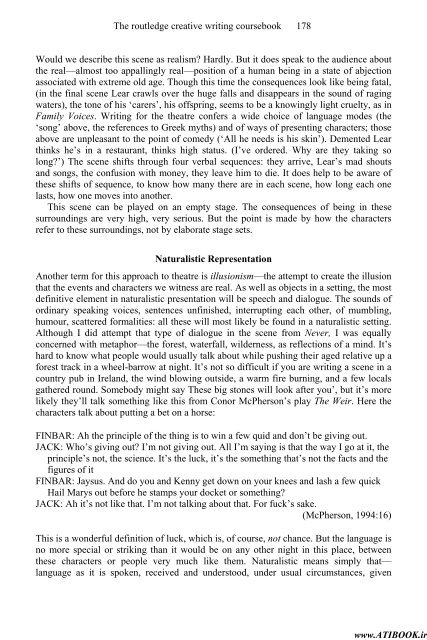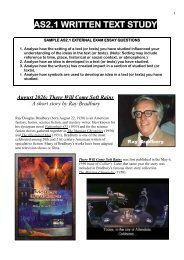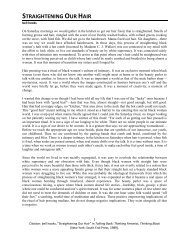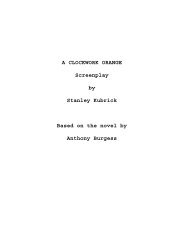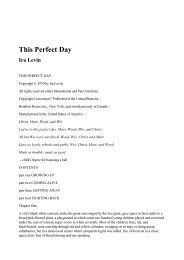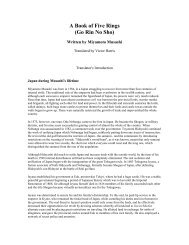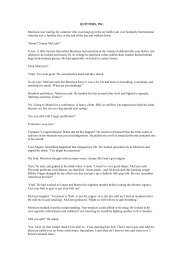9780415317856_the_routledge_creative_writing_coursebook
9780415317856_the_routledge_creative_writing_coursebook
9780415317856_the_routledge_creative_writing_coursebook
Create successful ePaper yourself
Turn your PDF publications into a flip-book with our unique Google optimized e-Paper software.
www.ATIBOOK.irThe <strong>routledge</strong> <strong>creative</strong> <strong>writing</strong> <strong>coursebook</strong> 178Would we describe this scene as realism? Hardly. But it does speak to <strong>the</strong> audience about<strong>the</strong> real—almost too appallingly real—position of a human being in a state of abjectionassociated with extreme old age. Though this time <strong>the</strong> consequences look like being fatal,(in <strong>the</strong> final scene Lear crawls over <strong>the</strong> huge falls and disappears in <strong>the</strong> sound of ragingwaters), <strong>the</strong> tone of his ‘carers’, his offspring, seems to be a knowingly light cruelty, as inFamily Voices. Writing for <strong>the</strong> <strong>the</strong>atre confers a wide choice of language modes (<strong>the</strong>‘song’ above, <strong>the</strong> references to Greek myths) and of ways of presenting characters; thoseabove are unpleasant to <strong>the</strong> point of comedy (‘All he needs is his skin’). Demented Learthinks he’s in a restaurant, thinks high status. (I’ve ordered. Why are <strong>the</strong>y taking solong?’) The scene shifts through four verbal sequences: <strong>the</strong>y arrive, Lear’s mad shoutsand songs, <strong>the</strong> confusion with money, <strong>the</strong>y leave him to die. It does help to be aware of<strong>the</strong>se shifts of sequence, to know how many <strong>the</strong>re are in each scene, how long each onelasts, how one moves into ano<strong>the</strong>r.This scene can be played on an empty stage. The consequences of being in <strong>the</strong>sesurroundings are very high, very serious. But <strong>the</strong> point is made by how <strong>the</strong> charactersrefer to <strong>the</strong>se surroundings, not by elaborate stage sets.Naturalistic RepresentationAno<strong>the</strong>r term for this approach to <strong>the</strong>atre is illusionism—<strong>the</strong> attempt to create <strong>the</strong> illusionthat <strong>the</strong> events and characters we witness are real. As well as objects in a setting, <strong>the</strong> mostdefinitive element in naturalistic presentation will be speech and dialogue. The sounds ofordinary speaking voices, sentences unfinished, interrupting each o<strong>the</strong>r, of mumbling,humour, scattered formalities: all <strong>the</strong>se will most likely be found in a naturalistic setting.Although I did attempt that type of dialogue in <strong>the</strong> scene from Never, I was equallyconcerned with metaphor—<strong>the</strong> forest, waterfall, wilderness, as reflections of a mind. It’shard to know what people would usually talk about while pushing <strong>the</strong>ir aged relative up aforest track in a wheel-barrow at night. It’s not so difficult if you are <strong>writing</strong> a scene in acountry pub in Ireland, <strong>the</strong> wind blowing outside, a warm fire burning, and a few localsga<strong>the</strong>red round. Somebody might say These big stones will look after you’, but it’s morelikely <strong>the</strong>y’ll talk something like this from Conor McPherson’s play The Weir. Here <strong>the</strong>characters talk about putting a bet on a horse:FINBAR: Ah <strong>the</strong> principle of <strong>the</strong> thing is to win a few quid and don’t be giving out.JACK: Who’s giving out? I’m not giving out. All I’m saying is that <strong>the</strong> way I go at it, <strong>the</strong>principle’s not, <strong>the</strong> science. It’s <strong>the</strong> luck, it’s <strong>the</strong> something that’s not <strong>the</strong> facts and <strong>the</strong>figures of itFINBAR: Jaysus. And do you and Kenny get down on your knees and lash a few quickHail Marys out before he stamps your docket or something?JACK: Ah it’s not like that. I’m not talking about that. For fuck’s sake.(McPherson, 1994:16)This is a wonderful definition of luck, which is, of course, not chance. But <strong>the</strong> language isno more special or striking than it would be on any o<strong>the</strong>r night in this place, between<strong>the</strong>se characters or people very much like <strong>the</strong>m. Naturalistic means simply that—language as it is spoken, received and understood, under usual circumstances, given


